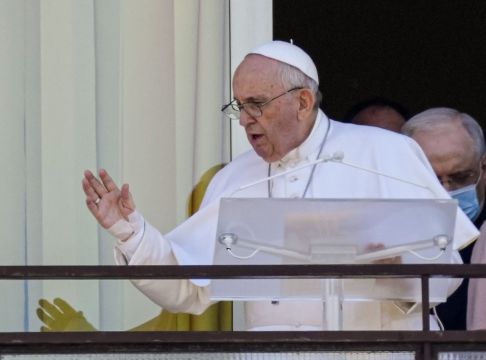Pope Francis has cracked down on the spread of the old Latin Mass, reversing one of Benedict XVI’s signature decisions in a major challenge to traditionalist Catholics who immediately condemned it as an attack on them and the ancient liturgy.
Francis reimposed restrictions on celebrating the Latin Mass that Benedict relaxed in 2007, and went further to limit its use.
The pontiff said he was taking action because Benedict’s reform had become a source of division in the church and been used by Catholics opposed to the Second Vatican Council, the 1960s meetings that modernised the Church and its liturgy.

Critics said they had never before witnessed a Pope so thoroughly reversing a predecessor’s policy. That the reversal concerned something so fundamental as the liturgy, while Benedict is still alive and living in the Vatican as a retired pontiff, only amplified the extraordinary nature of Francis’s move, which is set to provoke more right-wing hostility.
Francis, 84, issued a new law requiring individual bishops to approve celebrations of the old Mass, also called the Tridentine Mass, and requiring newly ordained priests to receive explicit permission to celebrate it from their bishops in consultation with the Vatican.
Under the new law, bishops must also determine if current groups of faithful attached to the old Mass accept Vatican II, which allowed for Mass to be celebrated in the vernacular rather than Latin. These groups can no longer use regular parishes for their Masses, and bishops must find an alternative location for them.
In addition, Francis said bishops are no longer allowed to authorise the formation of any new pro-Latin Mass groups in their dioceses.
Francis said he was taking action to promote unity and heal divisions within the Church that had grown since Benedict’s 2007 document, Summorum Pontificum.
He said he based his decision on a 2020 Vatican survey of all the world’s bishops, whose “responses reveal a situation that preoccupies and saddens me, and persuades me of the need to intervene”.
His move created uproar among traditionalists already opposed to Francis’s more progressive leanings and nostalgic for Benedict’s doctrinaire papacy.
“This is an extremely disappointing document which entirely undoes the legal provisions” of Benedict’s 2007 document, said Joseph Shaw, chairman of the Latin Mass Society of England and Wales.
While Latin celebrations can continue, “the presumption is consistently against them: bishops are being invited to close them down”, Mr Shaw said, adding that the requirement for Latin Masses to be held outside a parish was “unworkable”.
“This is an extraordinary rejection of the hard work for the Church and the loyalty to the hierarchy which has characterised the movement for the Traditional Mass for many years, which I fear will foster a sense of alienation among those attached to the Church’s ancient liturgy,” Mr Shaw said.
Benedict issued his document in 2007 to reach out to a breakaway group that celebrates the Latin Mass, the Society of St Pius X, which had split from Rome over the reforms of Vatican II.
But Francis said Benedict’s effort to foster unity had essentially backfired.
The opportunity offered by Benedict, the Pope said in a letter to bishops, was “exploited to widen the gaps, reinforce the divergences, and encourage disagreements that injure the Church, block her path, and expose her to the peril of division”.
Francis said he was “saddened” that the use of the old Mass “is often characterised by a rejection not only of the liturgical reform, but of the Vatican Council II itself, claiming, with unfounded and unsustainable assertions, that it betrayed the Tradition and the ‘true Church’”.
The attack on Summorum is the strongest rebuke and Pontiff has done to any predecessor in living memory.
Shocking, and terrifying.
Francis HATES US.
Francis HATES Tradition.
Francis HATES all that is good and beautiful.
Francis is an Anti-Christical figure for this age. https://t.co/baHgcfF0bK— Rorate Caeli (@RorateCaeli) July 16, 2021
Traditionalists and Catholics attached to the old liturgy accused Francis of heresy for opening the door to letting divorced and civilly remarried Catholics receive Communion.
Rorate Caeli, a popular traditionalist blog run in the US, said Francis’s “attack” was the strongest rebuke of a Pope against his predecessors in living memory.
“Shocking, and terrifying,” the group tweeted. “Francis HATES US. Francis HATES Tradition. Francis HATES all that is good and beautiful.”
But it concluded: “FRANCIS WILL DIE, THE LATIN MASS WILL LIVE FOREVER.”
Messa in Latino, an Italian traditionalist blog, said Francis talks a lot about mercy, but only for some.
“Mercy always and only for sinners (who are not asked to repent) but no mercy for those few traditional Catholics,” the blog said.
But Christopher Bellitto, professor of church history at Kean University, said Francis was right to intervene, noting that Benedict’s original decision had a slew of unintended consequences that created internal division and temporarily damaged relations with Jews.
“Francis hits it right on the head with his observation that Benedict’s 2007 loosening of regulations against the Latin rite allowed others to use it for division,” he said. “The blowback proves his point.”







